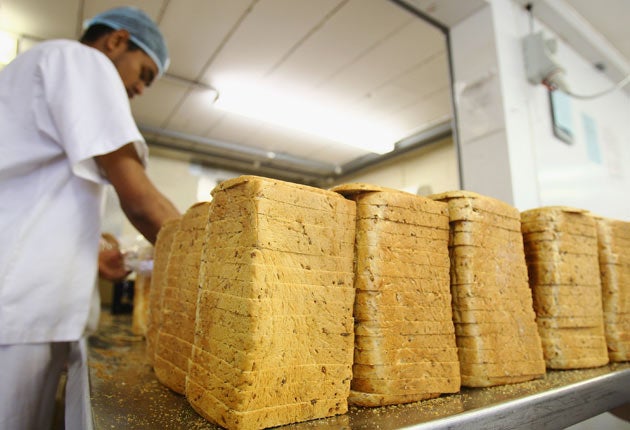Food inflation hits 4.9 per cent as energy bills rise by one-fifth
Family of four can expect weekly food bill of £100 to increase by £5, which adds up to £260 a year

Your support helps us to tell the story
From reproductive rights to climate change to Big Tech, The Independent is on the ground when the story is developing. Whether it's investigating the financials of Elon Musk's pro-Trump PAC or producing our latest documentary, 'The A Word', which shines a light on the American women fighting for reproductive rights, we know how important it is to parse out the facts from the messaging.
At such a critical moment in US history, we need reporters on the ground. Your donation allows us to keep sending journalists to speak to both sides of the story.
The Independent is trusted by Americans across the entire political spectrum. And unlike many other quality news outlets, we choose not to lock Americans out of our reporting and analysis with paywalls. We believe quality journalism should be available to everyone, paid for by those who can afford it.
Your support makes all the difference.The cost of living has continued to soar in the past 12 months, with further price rises in food and energy expected to cost consumers hundreds of pounds more over the coming year.
Click HERE to view graphic (142k jpg)
Despite the apparent allure of supermarket bargains, a typical basket of fresh produce – including bread, meat and vegetables – now costs 4.9 per cent more than it did in 2010. And it is rising at its fastest rate in almost two years.
Scottish Power also signalled yesterday what is expected to be the first in a fresh wave of domestic-energy price rises as it announced that its average gas tariff would increase by 19 per cent from August, with electricity also up 10 per cent.
The latest gloomy figures come despite an overall slowdown in shop-price rises for non-food goods, which fell slightly to 2.3 per cent. But in a further sign of the sluggish state of the economic recovery, this was blamed largely on weakening demand.
The latest shop-price index from the British Retail Consortium (BRC) and Nielsen blames the rising cost of food on the growing demand for commodities in the developing world, particularly in China, combined with failing harvests and the runaway cost of oil, which affects all aspects of food production – particularly transport and processing. A family of four can expect to see a weekly food bill of £100 increase by £5, adding up to £260 a year.
Despite predictions by the Bank of England that overall inflation is set to peak at 5 per cent this year before falling, the cost of food continued its upward march, rising again last month by 0.2 per cent compared with April. Increasingly expensive fresh produce accounted for much of that.
To make matters worse, farmers in the UK, who in areas such as East Anglia have seen only a fifth of normal rainfall in the past six weeks, are expecting this year's harvest to be down 15 per cent – further driving up the costs of staples such as bread.
This coincides with the worst drought for 50 years in China, which has recently switched from being a net exporter to an importer of grain and rice. And conditions are dry in northern Europe and the southern United States.
But it is the growing demand from increasingly affluent consumers in emerging economies that is putting pressure on the wallets of British consumers. While commodities prices form only a small part of the final cost paid at supermarket checkouts, the cost of corn on the international market is up 112 per cent on last year, while coffee is up 57 per cent, wheat 72 per cent and sugar 51 per cent.
Richard Lim, a BRC economist, said consumers were doing what they could to cope with the price rises, while supermarkets were also being squeezed because they could not pass the costs on as quickly as they increased. "There has been a fall in the volume of food sales and there has been a definite trend for consumers to search around more and to look for deals or to trade down from premium ranges to value products," he said.
"The largest cost faced by retailers is the cost of the goods they sell. Some of this will inevitably be passed on to the consumer because supermarkets operate on such thin margins and the market is so competitive. Retailers are using promotions and discounts to take out the cost of inflation."
Terry Jones, communications director at the Food and Drink Federation, said the new data should act as a wake-up call for policy makers to invest in new technology to improve yields and reduce food-price volatility. "The UK is now a price taker in the global market – the rest of the world sets the price for our farms," he said.
Watchdog groups reacted angrily to the rise in energy prices, which follows another increase seven months ago and findings by Ofgem that the big six energy companies hiked prices faster than they dropped them in response to international market conditions.
Join our commenting forum
Join thought-provoking conversations, follow other Independent readers and see their replies
0Comments